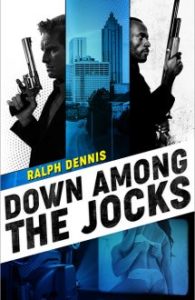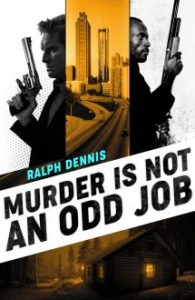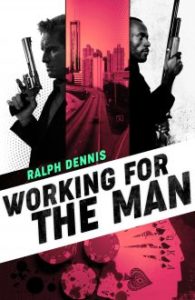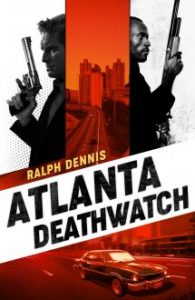My expensive, life-changing addiction began six years ago when a man approached me in a nameless hotel in a city I don’t remember.
“You’re really going love this,” Bill Crider said, almost in a whisper. “And I’m not going to let you leave here until you buy it.”
We were standing in front of a used bookseller’s table at a writer’s conference. I looked down and saw that Bill was holding a yellowed, brittle paperback out to me. It was entitled Hardman #1, The Charleston Knife is Back in Town by Ralph Dennis. The slug line across the top of the cover read “Brace yourself for broads, bullets, and bare-fisted action!”
It was obvious from the numbered title that it was one of those cheap, men’s action adventure paperbacks, a genre I knew well, having written, under the pseudonym “Ian Ludlow,” a series called .357 Vigilante in the mid-1980s for the same publisher that released this book. While there were some gems in the genre, most of them were hack work, badly written excuses for explicit sex and graphic violence that were sold in grocery store spinner racks nationwide. And a book called “Hardman”—wink, wink, nudge nudge—promised to be among the worst of them.
Bill must have seen the skepticism on my face so he smiled and said, “Trust me. You won’t regret it.”
This is how it often is with pushers. Have a taste, they say, it won’t hurt you.
And Bill was particularly good at pushing old paperbacks and forgotten authors. He was a kind, decent, warm man, an acclaimed author, and an expert on crime fiction. People trusted him. I trusted him.
***
So I bought the book…and quickly read it.
To my surprise, and delight, it was nothing like what I expected. Jim Hardman is in his 40s, a pudgy, balding ex-cop with a steady girlfriend…who does odd jobs with his drinking buddy Hump Evans, a black ex-NFL player who supports his playboy lifestyle by hiring himself out as muscle. They are functioning alcoholics, drinking booze morning, noon and night as if its mineral water, doing whatever they have to do, short of murder or bank robbery, to make a living in the seamy underworld of 1970s Atlanta, as equal partners and, although it remains unspoken, close friends.
This wasn’t men’s action-adventure fiction. This was straight-up, hardboiled crime fiction, written in a tight, evocative voice. And it was wonderful. I was so excited about what I was reading, I didn’t even wait to finish the book before I raved to my friends about it on Facebook on November 20, 2012:
I am mid-way through what is labeled as Hardman #1: The Charleston Knife is Back in Town by Ralph Dennis (Pinnacle 1982)…but it’s actually a reprint of book #2 in the series from 1974. No matter, I am loving it. So much so, that I’ve hunted down and ordered the rest of the books in the long out-of-print series, including the actual Hardman #1, Atlanta Deathwatch.
A few days later, I posted the one and only review at the time for Charleston Knife on Amazon:
***** Fantastic Series, Deserves Wide Acclaim
November 25, 2012
Article continues after advertisementFormat: Mass Market Paperback
It’s a tragedy this book was marketed/packaged as a men’s action adventure novel. Dennis was the real deal…these deserved to be recognized as straight-up noir. These novels pre-date Robert B. Parker’s SPENSER series and yet are strikingly similar… Makes me wonder if Parker might have read one of the Hardmans at some point and it was percolating in his subconscious when he created his own series. Like Spenser, Hardman is an ex-cop turned investigator/bodyguard who lives by his own moral code and teams up often with a rough, violent African-American enforcer. He’s also got a steady, loving girlfriend who understands, if not totally accepts, who he is and what he does (and isn’t nearly as irritating as Susan Silverman), and a friend on the force (ala Belson and Quirk) who helps him out. He’s also deeply tied in with the local mob bosses who have an understanding with him (again, like Spenser). And Atlanta, the city where Hardman lives, is a vivid character in the books (like Boston in the Spensers). The tone of the Hardmans is very different than the Spensers, and Spenser is far more moralistic, physically capable, smart-assy, and sure of himself than Hardman, but otherwise the franchise elements are almost identical. Ralph Dennis has a great voice, a wicked sense of humor, and a very sharp eye for detail. It’s a damn shame this man never broke out into the big leagues. I loved this book and I am eager to devour the rest of this series.
That was an understatement. I set the rest of my life aside and quickly tore through the series, sharing my experience on social media as I went along. For example:
Facebook Status Update. December 3, 2012
Reading HARDMAN #3 by Ralph Dennis and am loving it. What a great @#$%^ series. Tragedy it’s so unknown and overlooked. The rest of the books just arrived from booksellers across the country. Can’t wait to plow through’em all.
Article continues after advertisement
I was hooked. I had no idea how deeply.
As I was devouring the series, I started looking into Ralph Dennis. There was very little written about him. I learned that he was born in 1931 in Sumter, South Carolina and received a masters degree from University of North Carolina, where he later taught film and television writing after serving a stint in the Navy.
Atlanta Deathwatch was the first novel he sold…and he wrote the next six novels in the series in just one year. That amazed me. There was a time when I was writing four books a year, alternating between original Diagnosis Murder and Monk novels, and it nearly killed me.
The first seven Hardman novels were published in rapid succession by Popular Library in 1974 and poorly packaged as a cheap men’s action-adventure paperbacks with numbered titles.
Even so, and this is truly astonishing, somehow some top critics got their hands on the books and saw past the cheesy covers. The New York Times praised the Hardman novels for “expert writing, plotting, and an unusual degree of sensitivity. Dennis has mastered the genre and supplied top entertainment.” The Philadelphia Daily News proclaimed Hardman “the best series around, but they’ve got such terrible covers…” Unfortunately, Popular Library didn’t take the hint and continued to present the series as numbered hack work, dooming the novels to a short shelf-life and obscurity.
Ralph Dennis wanted more…and deserved better. So he walked away from the series…Ralph Dennis wanted more…and deserved better. So he walked away from the series, trying his luck with a paperback potboiler (Atlanta, Popular Library 1975) and the first book in what he hoped would be a harder-edged series (Dead Man’s Game, Berkley 1976). But when both books bombed, he returned to Hardman, writing six more in the series that Popular Library released between 1976 & 1977.
His final, published novel was his shot at the big time: a hardcover, World War II heist thriller entitled MacTaggart’s War that prestigious publisher Holt Rinehart & Winston released in 1979. It tanked.
He kept writing, but couldn’t get anything picked up. In 1982, Pinnacle Books republished The Charleston Knife is Back In Town, with an eye towards reviving the series, but abandoned those plans when the reprint sold poorly.
At the time of his death in 1988, Ralph Dennis was living alone, drinking too much, and working as a clerk at a used bookstore in Atlanta. He left behind a suitcase full of unpublished manuscripts.
***
Although he never achieved the wide audience he deserved during his lifetime, Ralph’s books were beloved by crime writers like Bill Crider (who kept shoving the paperbacks into the hands of guys like me) and his close friend Joe R. Lansdale, who generously credited Hardman as the inspiration for his wildly successful Hap & Leonard series.
In April 2012, I finished reading The Buy Back Blues, the 12th and final book in the Hardman series, and I was heartbroken. I couldn’t believe it was the end, that I wouldn’t have Jim Hardman and Hump Evans in my life anymore. They weren’t just memorable characters in a series of books to me any longer. They’d gotten under my skin, into my blood. I didn’t want my relationship with them to be over. I was addicted.
I’d run out of Hardmans, but not books by Ralph Dennis.
I quickly read Ralph’s three other published novels. They were good, but they weren’t the same as Hardman, and in the case of MacTaggart’s War, what I saw most was the squandered potential, a book that might have succeeded if only he’d had a good editor. It was frustrating…and I wished there was something I could do about it…and some way I could get Hardman out to wider audience.
And then it hit me—maybe I could.
I’d enjoyed a lot of success self-publishing my out-of-print backlist, in some cases making much more money off the new editions of my books than I did when they were originally released. I figured if I could do it for my own work, why couldn’t I do it for Ralph?
I did some digging and learned the rights to Ralph’s books had passed to his sister Irma and then, upon her death, to her four heirs. Irma’s attorney was kind enough to share with me Ralph’s unpublished manuscripts. None of them was a lost Hardman, much to my disappointment, but they had potential if I could do some editorial work on them.
This was how I’d feed my Hardman addiction…which, when I got right down to it, was really a deep appreciation for Ralph Dennis’ writing and my desire to share it with others.
This was how I’d feed my Hardman addiction…which, when I got right down to it, was really a deep appreciation for Ralph Dennis’ writing and my desire to share it with others.The next step was making a deal with Ralph’s estate. I’d never done anything like that before, so I asked for advice from my friend Joel Goldman, a lawyer-turned-author, on how I should proceed. He’d had a lot of success self-publishing his out-of-print backlist, too, and I knew he was a lot smarter than me. When he learned what I wanted to do, not only did he think it was a good idea, but that it was also a business plan.
A what?
A way to make some money, he said. There had to be other books out there, like the Hardman series, that never reached the wider audience they deserved… or perhaps they had, but had fallen out-of-print anyway. Why not use our savvy and experience to bring them back, too?
Sure, why not?
***
So we launched a publishing company together, Brash Books, and I made my pitch to Ralph’s four heirs: I wanted to acquire the copyright to Hardman novels, and everything else that Ralph wrote, published and unpublished, and bring them back into print. I wanted the copyright, rather than simply licensing them to republish, so I would have the freedom to make the editorial changes that I felt were necessary to get his unpublished books into shape…and to significantly revise MacTaggart’s War.
I needed all four heirs to agree in order to make the deal…but there was one hold-out who couldn’t decide what to do. We were at a standstill.
Meanwhile, Brash Books opened for business in September 2014. We published nearly a hundred titles over the next four years (a mix of reprints and original novels) to critical acclaim and launched an audiobook line. We’d even acquired the copyright to the crime novels by Carolyn Weston, which were the basis for the TV series The Streets of San Francisco, and commissioned a successful new book in the series by Robin Burcell.
But it nagged at me that we still didn’t have the Hardman books that inspired me to invest over $100,000 into launching a publishing company in the first place… just so I could bring them back into print and feed my addiction.
I refused to give up. Twice-a-year, I reached out to Ralph’s heirs, hoping the one hold-out would decide to make a deal. This summer, it finally happened. I closed the deal. After six long years for me, and decades after the final book in the series was published, Hardman and Hump were coming back.
After six long years for me, and decades after the final book in the series was published, Hardman and Hump were coming back.On December 3rd, Brash Books released the first four Hardman novels, with an introduction by Joe R. Lansdale, in trade paperback and ebook editions, as well as an audiobook adaptation of Atlanta Deathwatch (more audiobooks are on the way). The reaction has been great. We’ve sold over a thousand copies already and Publishers Weekly gave the Atlanta Deathwatch reprint a rave review.
The new editions, all 12 of which will be out before the end of 2019, also include deeply personal, and often very moving, “afterword” essays by some of Ralph’s oldest friends and former students, giving readers a unique perspective on the man and a deeper appreciation of his work. There are also essays by some novelists who love the Hardman books and are almost as addicted to them as I am. I say “almost” because I can safely say none of those writers has it quite as bad as me…or would have gone to the lengths I have to feed it. First, I became a publisher and now I’ve become Ralph Dennis, at least as far as his literary life is concerned.
Hardman is mine now….and so are all of those “lost manuscripts” that Ralph kept in a suitcase. My goal is to get Ralph the wide audience and artistic appreciation that eluded him in his lifetime (and, strangely, he gave me the platform to do it. I would never have become a publisher if not for Hardman).
To that end, I’ve cut 35,000 words from MacTaggart’s War and rearranged the chapters to build character, heighten suspense and tighten the story. It’s what an editor should have done for the book back in 1979. Brash is releasing the new edition, retitled The War Heist, in March.
In 2020, I hope to begin publishing Ralph’s “lost manuscripts.” And who knows, maybe someday I’ll feed that Hardman addiction, and my desire to see those characters again, by writing the 13th book in the series myself.
I just wish that Bill Crider, who passed away in early 2018, was here to see what he started by pushing that book into my hands and getting me hooked.
This is one addiction I’m glad to have…and hope I never shake.
***






















